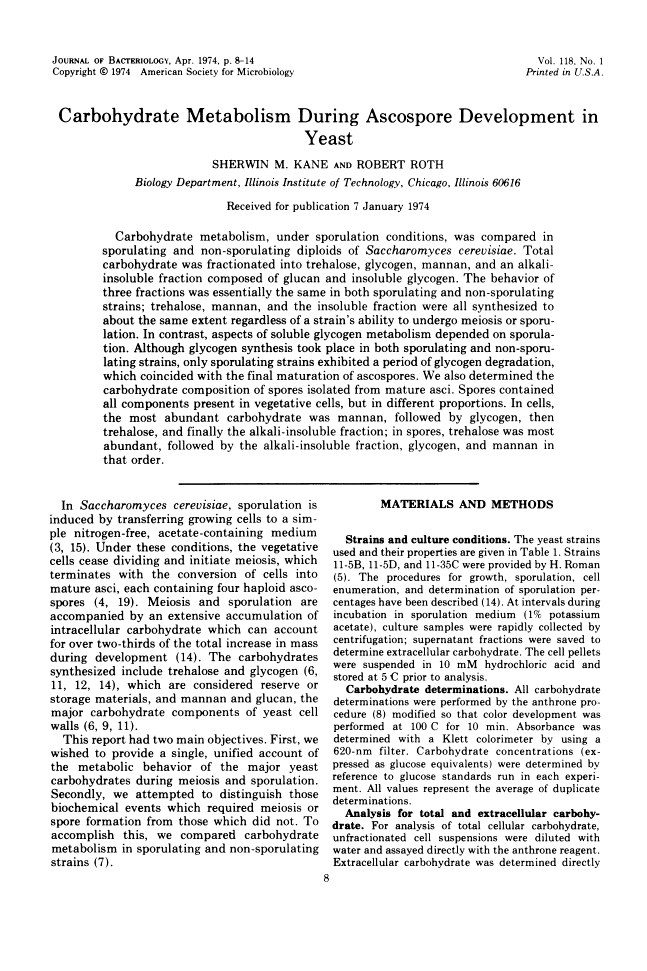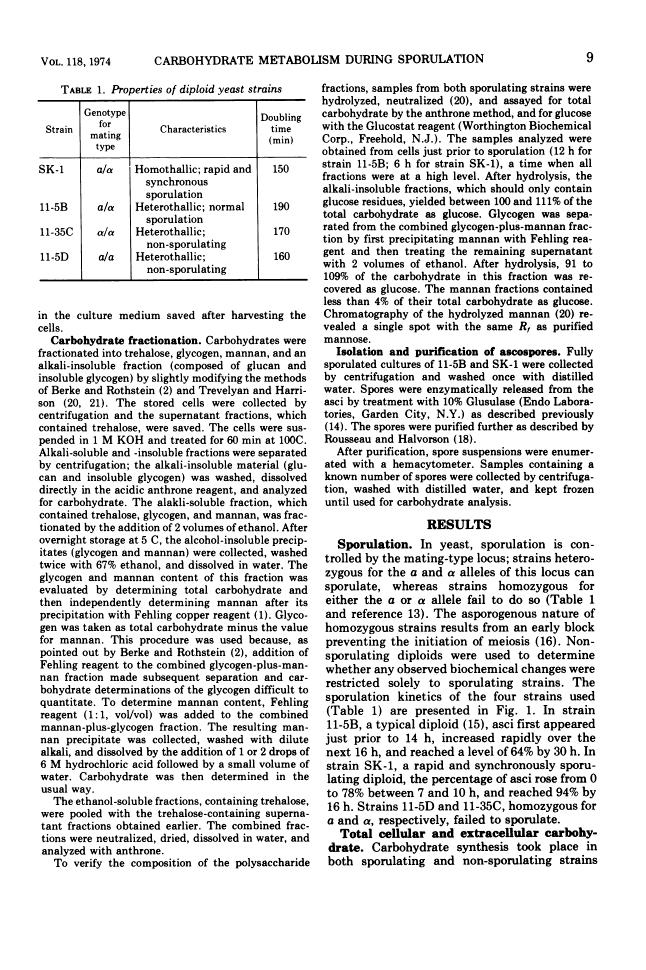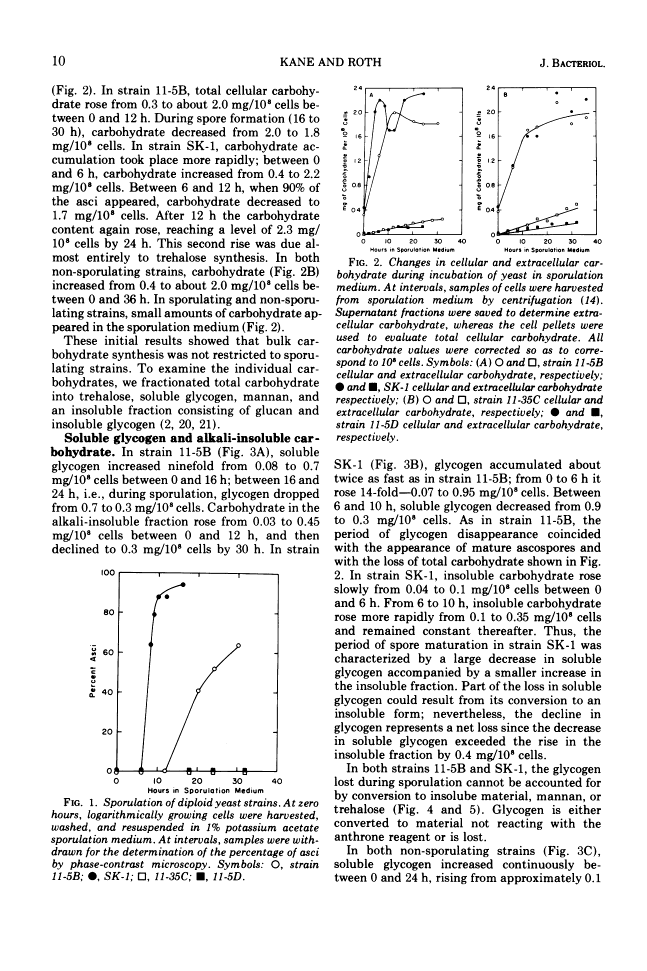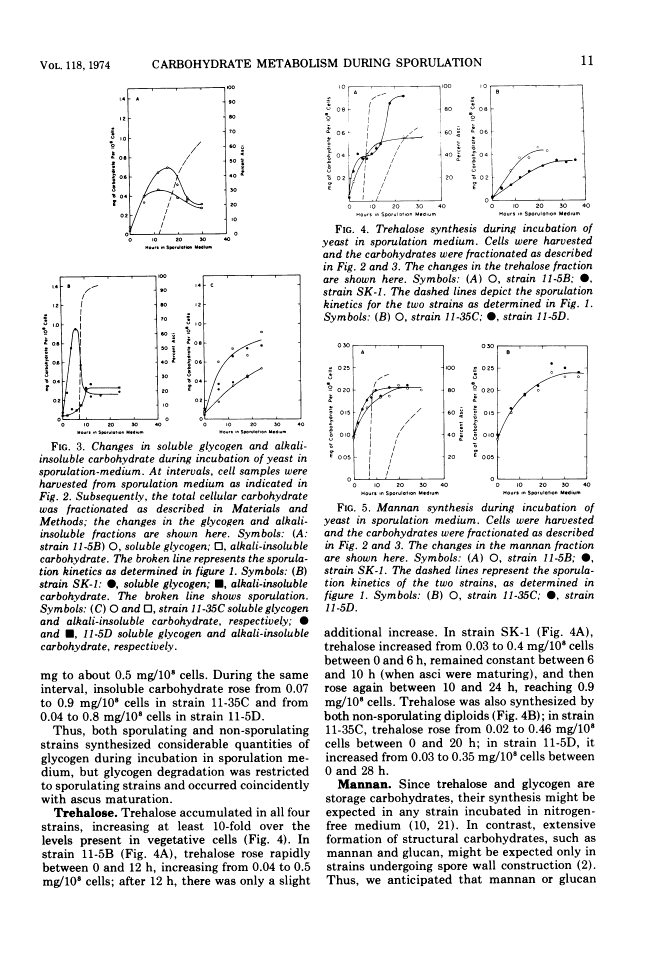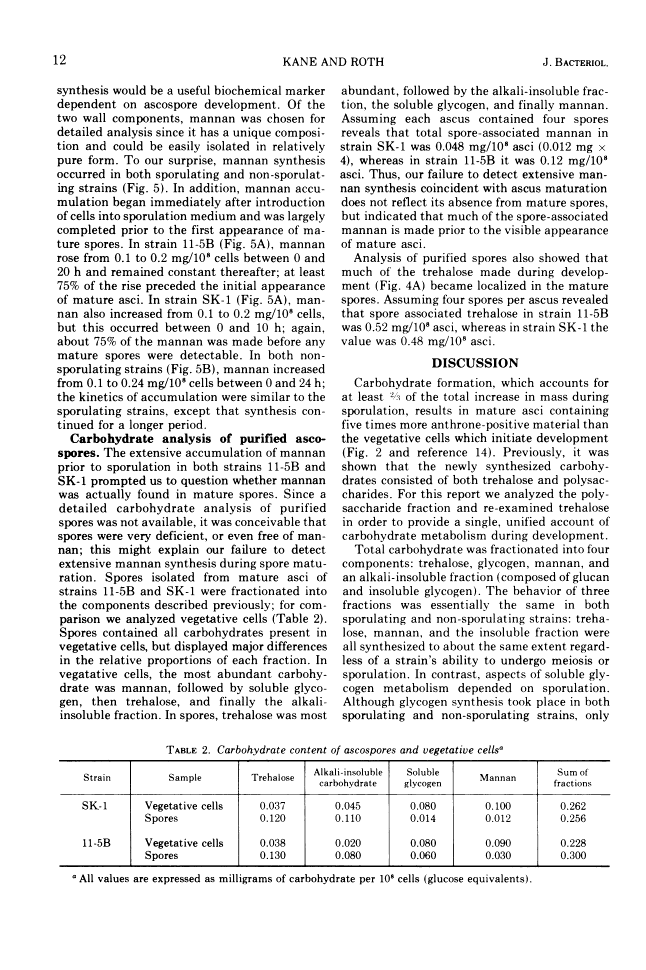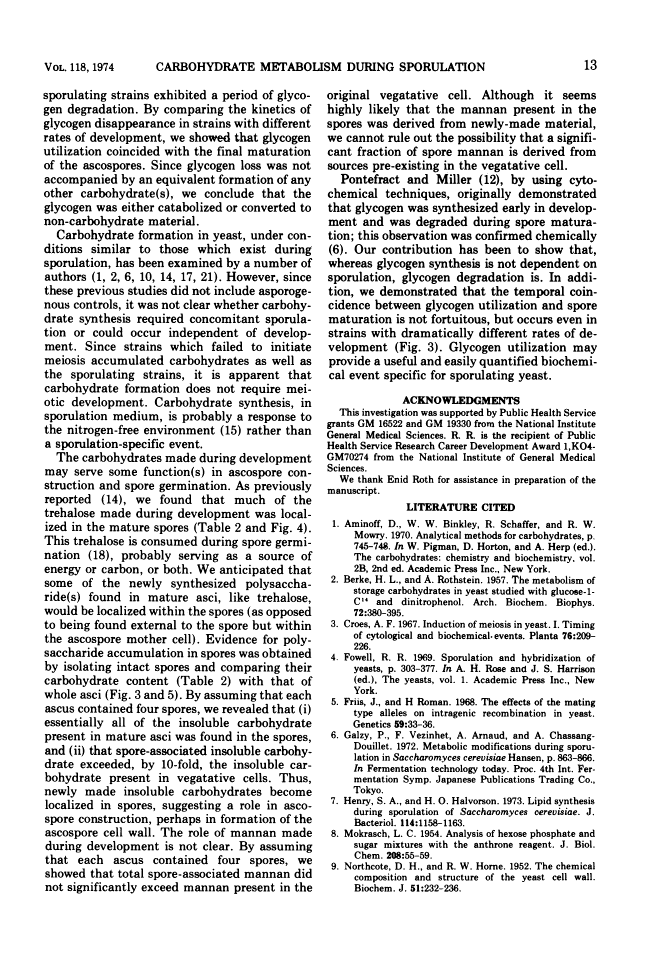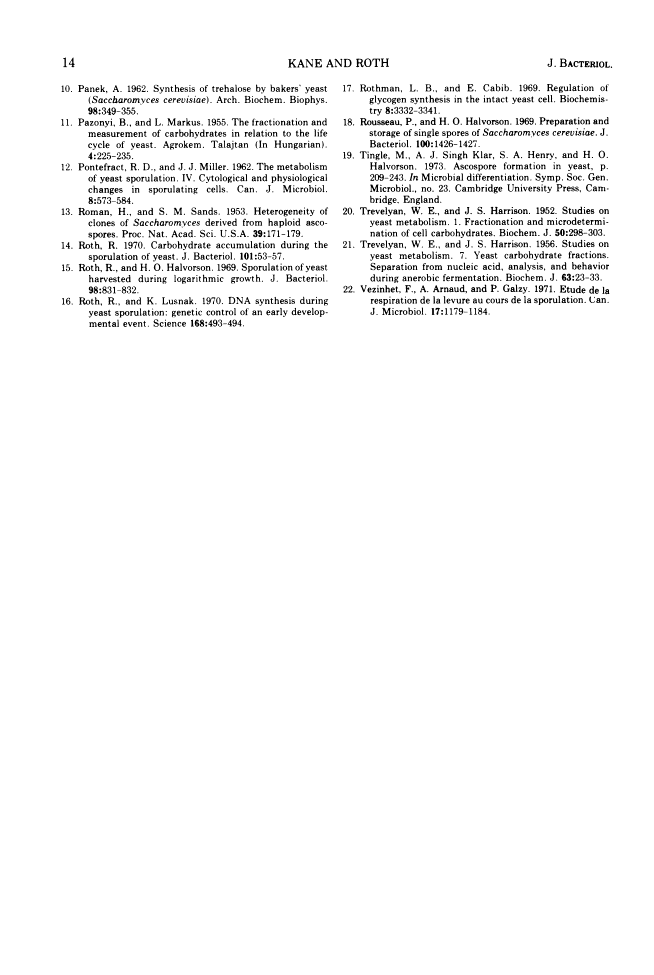Abstract
Free full text

Carbohydrate Metabolism During Ascospore Development in Yeast
Abstract
Carbohydrate metabolism, under sporulation conditions, was compared in sporulating and non-sporulating diploids of Saccharomyces cerevisiae. Total carbohydrate was fractionated into trehalose, glycogen, mannan, and an alkali-insoluble fraction composed of glucan and insoluble glycogen. The behavior of three fractions was essentially the same in both sporulating and non-sporulating strains; trehalose, mannan, and the insoluble fraction were all synthesized to about the same extent regardless of a strain's ability to undergo meiosis or sporulation. In contrast, aspects of soluble glycogen metabolism depended on sporulation. Although glycogen synthesis took place in both sporulating and non-sporulating strains, only sporulating strains exhibited a period of glycogen degradation, which coincided with the final maturation of ascospores. We also determined the carbohydrate composition of spores isolated from mature asci. Spores contained all components present in vegetative cells, but in different proportions. In cells, the most abundant carbohydrate was mannan, followed by glycogen, then trehalose, and finally the alkali-insoluble fraction; in spores, trehalose was most abundant, followed by the alkali-insoluble fraction, glycogen, and mannan in that order.
Full text
Full text is available as a scanned copy of the original print version. Get a printable copy (PDF file) of the complete article (1.0M), or click on a page image below to browse page by page. Links to PubMed are also available for Selected References.
Selected References
These references are in PubMed. This may not be the complete list of references from this article.
- BERKE HL, ROTHSTEIN A. The metabolism of storage carbohydrates in yeast, studied with glucose-1-C14 and dinitrophenol. Arch Biochem Biophys. 1957 Dec;72(2):380–395. [Abstract] [Google Scholar]
- Friis J, Roman H. The effect of the mating-type alleles on intragenic recombination in yeast. Genetics. 1968 May;59(1):33–36. [Europe PMC free article] [Abstract] [Google Scholar]
- Henry SA, Halvorson HO. Lipid synthesis during sporulation of Saccharomyces cerevisiae. J Bacteriol. 1973 Jun;114(3):1158–1163. [Europe PMC free article] [Abstract] [Google Scholar]
- MOKRASCH LC. Analysis of hexose phosphates and sugar mixtures with the anthrone reagent. J Biol Chem. 1954 May;208(1):55–59. [Abstract] [Google Scholar]
- NORTHCOTE DH, HORNE RW. The chemical composition and structure of the yeast cell wall. Biochem J. 1952 May;51(2):232–236. [Europe PMC free article] [Abstract] [Google Scholar]
- PANEK A. Synthesis of trehalose by baker's yeast (Saccharomyces cerevisiae). Arch Biochem Biophys. 1962 Sep;98:349–355. [Abstract] [Google Scholar]
- Roman H, Sands SM. Heterogeneity of Clones of Saccharomyces Derived from Haploid Ascospores. Proc Natl Acad Sci U S A. 1953 Mar;39(3):171–179. [Europe PMC free article] [Abstract] [Google Scholar]
- Roth R. Carbohydrate accumulation during the sporulation of yeast. J Bacteriol. 1970 Jan;101(1):53–57. [Europe PMC free article] [Abstract] [Google Scholar]
- Roth R, Halvorson HO. Sporulation of yeast harvested during logarithmic growth. J Bacteriol. 1969 May;98(2):831–832. [Europe PMC free article] [Abstract] [Google Scholar]
- Roth R, Lusnak K. DNA synthesis during yeast sporulation: genetic control of an early developmental event. Science. 1970 Apr 24;168(3930):493–494. [Abstract] [Google Scholar]
- Rothman LB, Cabib E. Regulation of glycogen synthesis in the intact yeast cell. Biochemistry. 1969 Aug;8(8):3332–3341. [Abstract] [Google Scholar]
- Rousseau P, Halvorson HO. Preparation and storage of single spores of Saccharomyces cerevisiae. J Bacteriol. 1969 Dec;100(3):1426–1427. [Europe PMC free article] [Abstract] [Google Scholar]
- TREVELYAN WE, HARRISON JS. Studies on yeast metabolism. I. Fractionation and microdetermination of cell carbohydrates. Biochem J. 1952 Jan;50(3):298–303. [Europe PMC free article] [Abstract] [Google Scholar]
- TREVELYAN WE, HARRISON JS. Studies on yeast metabolism. 7. Yeast carbohydrate fractions. Separation from nucleic acid, analysis, and behaviour during anaerobic fermentation. Biochem J. 1956 May;63(1):23–33. [Europe PMC free article] [Abstract] [Google Scholar]
- Vezinhet F, Arnaud A, Galzy P. Etude de la respiration de la levure au cours de la sporulation. Can J Microbiol. 1971 Sep;17(9):1179–1184. [Abstract] [Google Scholar]
Associated Data
Articles from Journal of Bacteriology are provided here courtesy of American Society for Microbiology (ASM)
Full text links
Read article at publisher's site: https://doi.org/10.1128/jb.118.1.8-14.1974
Read article for free, from open access legal sources, via Unpaywall:
https://jb.asm.org/content/jb/118/1/8.full.pdf
Free to read at jb.asm.org
http://jb.asm.org/cgi/content/abstract/118/1/8
Free after 4 months at jb.asm.org
http://jb.asm.org/cgi/reprint/118/1/8
Citations & impact
Impact metrics
Citations of article over time
Smart citations by scite.ai
Explore citation contexts and check if this article has been
supported or disputed.
https://scite.ai/reports/10.1128/jb.118.1.8-14.1974
Article citations
Naming internal insertion alleles created using CRISPR in Saccharomyces cerevisiae.
MicroPubl Biol, 2024, 08 Aug 2024
Cited by: 0 articles | PMID: 39185013 | PMCID: PMC11342080
The Dmc1 recombinase physically interacts with and promotes the meiotic crossover functions of the Mlh1-Mlh3 endonuclease.
Genetics, 227(3):iyae066, 01 Jul 2024
Cited by: 0 articles | PMID: 38657110
SPO-Seq: An Accessible Method for Efficient Evaluation of Spo11 Catalytic Activity and Profiling Meiotic DSB Hotspots in Saccharomyces cerevisiae.
Methods Mol Biol, 2818:23-43, 01 Jan 2024
Cited by: 0 articles | PMID: 39126465
Assembly and function of the amyloid-like translational repressor Rim4 is coupled with nutrient conditions.
EMBO J, 42(23):e113332, 03 Nov 2023
Cited by: 2 articles | PMID: 37921330 | PMCID: PMC10690475
A Method for Physical Analysis of Recombination Intermediates in Saccharomyces cerevisiae.
J Microbiol, 61(11):939-951, 01 Nov 2023
Cited by: 0 articles | PMID: 38082069
Go to all (295) article citations
Data
Similar Articles
To arrive at the top five similar articles we use a word-weighted algorithm to compare words from the Title and Abstract of each citation.
[Carbohydrate metabolism during the sporulation of Saccharomyces cerevisiae Hansen].
Z Allg Mikrobiol, 13(2):99-106, 01 Jan 1973
Cited by: 1 article | PMID: 4581218
Macromolecule synthesis and breakdown in relation to sporulation and meiosis in yeast.
J Bacteriol, 119(2):619-628, 01 Aug 1974
Cited by: 94 articles | PMID: 4604714 | PMCID: PMC245649
[Metabolism of reserve carbohydrates in multiplying and resting yeast cells].
Mikrobiologiia, 42(5):800-805, 01 Sep 1973
Cited by: 0 articles | PMID: 4600722
Reserve carbohydrates metabolism in the yeast Saccharomyces cerevisiae.
FEMS Microbiol Rev, 25(1):125-145, 01 Jan 2001
Cited by: 297 articles | PMID: 11152943
Review
